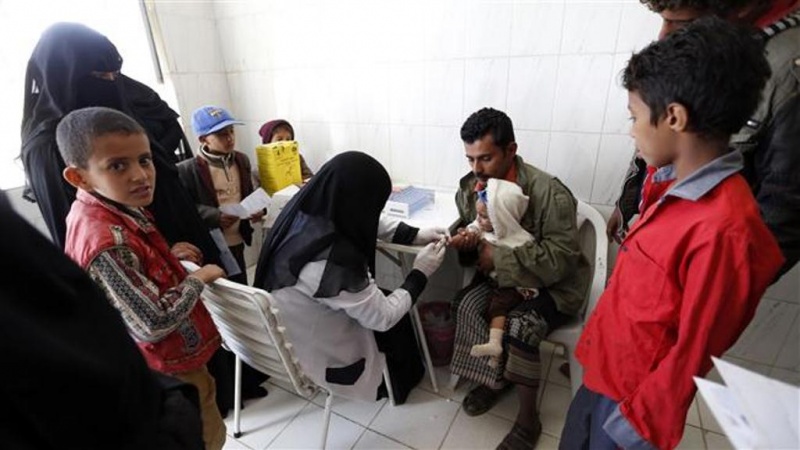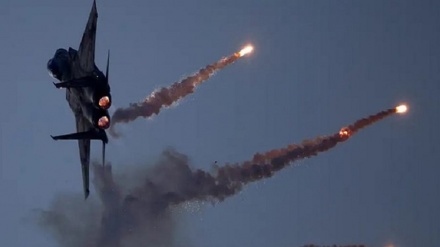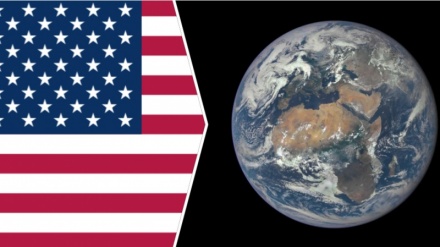Bani Saud's ongoing genocide in Yemen
According to the UN, every 10 minutes 1 child dies in Yemen as a result of the Saudi war and carnage in the country; though the real figure of casualties may be higher.
Famous journalist, Catherine Shakdom, has authored a piece on the issue of the Yemeni children’s endless catastrophe. It was published on Crescent International magazine.
On March 25, 2017 Yemen entered the third year of Bani Saud’s imposed war that has claimed more than 10,000 lives (according to other estimates over 20,000), displaced millions of civilians, and endangered the lives of countless desperate communities across the country.
Dr. Riaz Karim, former director of the Mona Relief Organization, and fellow at the Veritas Centre for Strategic Studies, confirmed that independent research on the ground painted a far more troubling picture. He noted, “Our team commissioned a humanitarian survey that puts the northern Yemen death toll at well over 20, 000.” He further added, “Whatever tally the UN has admitted to pales in comparison with reality. It is harsh in Yemen… much harsher than we can fathom if we consider that 7 million people stand today at death’s door on account of famine.”
A country ravaged by war, famine, abject poverty, and total despair, Yemen remains the worst bleeding scar in the Muslim World that few media outlets have dared to report on for fear of breaking Bani Saud’s imposed media ban. But it is impossible today to look at Yemen and pretend that humanitarian aid, food, and access to medical care have not been used as instruments of war so that civilians would be coerced into giving up their aspirations and trade their freedom for a morsel of bread.
Back in July 2015 only a few months into Yemen’s war MintPress News ran a report about the situation in the poorest country in the region. It blew the lid off Saudi regime’s dirty little secret, thus uncovering a covert attempt to profile humanitarian aid according to communities’ religious creeds. This was aimed at eroding Yemen’s sovereignty and defeat the Resistance Movement. MintPress News wrote,
The Kingdom is holding hostage not just Yemen but to some extent the international community, using the UN humanitarian institutions to wage war. It’s using institutions meant to offer relief as a means of weaponizing aid. Hassan Jayache, a senior leader of the Ansarullah movement said, “The Saudis have exerted political pressures on local NGOs and international aid organizations, demanding that aid be restricted to pre-approved segments of the population, based on political affiliations and according to religious criteria.”
In other words, Al Saud has decided to starve the Yemenis, hoping to break the Ansarullah’s momentum. VICE News echoed this in a damning expose in June 2015. The report read, ‘According to a UN memo obtained by VICE News, the Saudi regime has applied unprecedented conditions that could complicate and delay its disbursement — conditions that the UN appears to have quietly acquiesced to.’
According to aid workers and officials who spoke with VICE News, ever since its April 17 pledge, the Saudi regime has pushed for restrictions on how the aid would be given out, including that it not be spent in areas controlled by Ansarullah, which a Riyadh-led coalition has bombed since late-March.
For two painful long years Yemen has been subjected to a litany of abuses, injustices, and abominable war crimes, all under the gaze of the UN — the one international body whose charter and principles stipulate that these are meant to uphold international law.
But of the many grave violations that have been carried out against Yemen for more than two years, none would be as devastating as what the Saudi regime and its even more belligerent ally, the USA, are currently planning.
When even the most silent of parties — aid agencies and human rights groups — feel compelled to ring the alarm on what they describe as an upcoming humanitarian catastrophe, one must realize how intolerable Yemen’s war has become. Yet the two arrogant regimes in Washington and Riyadh are still hedging blood as a means of control.
Similarly, ReliefWeb wrote on April 13, 2017, ‘Yemenis are starving because of war. No natural disaster is responsible. No amount of humanitarian aid can solve the underlying problem. Without an immediate, significant course change, portions of the country, in the 21st century and under the watch of the Security Council, will likely tip into famine…. Avoiding famine, if this is still possible, requires the Saudi-led coalition, supporting Abed Rabbo Mansour Hadi against Ansarullah to halt what promises to be a bloody battle for Yemen’s most important port, Hodeida. It also requires immediate action by both sides to put aside differences and enable central bank technocrats to address the liquidity problem, pay public-sector salaries nationally, and regulate the riyal. For this to be sustainable, Yemenis need a ceasefire and a durable political settlement to have a chance at rebuilding the shattered economy.’
Before such a deluge of human suffering, US President Trump is building up a war narrative against Yemen, offering his medieval ally, the Saudi regime, the wherewithal to carry out the slaughter it has been calling for since March 2015. As for the international community one can assume that it will, as usual, deflect blame onto other parties to save face.
On April 12, 2017, Democracy Now reported, “Since taking office, Trump has rapidly expanded US military operations in Yemen. Last month, the US reportedly launched more than 49 strikes across the country — more strikes than the US has ever carried out in any single year in Yemen. The US has also resumed some weapons sales to the Saudis, after the transfers were frozen by Obama.” Having acquired a taste for war and blood, Trump appears just about ready to light up Yemen’s skies ahead of a grand military deployment on the ground just as Bani Saud are losing ground in the region. The one saving grace of a dying Wahhabi empire, America may soon learn that for all its wounds Yemen’s Resistance Movement will defend its homeland with the fury that sent empires of old running for the hills. But even with Trump’s eagerness to break Yemen’s resolve by jumping on Riyadh’s military taunt, US senators are not biting the neocons’ bullet.
Four US senators last month put forward legislation to limit arms sales to Riyadh over its troubled Yemen campaign. Fifty-five members of the US House of Representatives called on Trump in a letter to end both US refueling for Saudi coalition warplanes and logistical assistance for the Saudi-led bombings in Yemen — and they said Trump must seek congressional approval before he deepens US military involvement.
Senators who opposed Obama’s intervention in Yemen announced legislation to require Trump to certify Riyadh is targeting terrorist groups, minimizing harm to civilians, and facilitating humanitarian assistance before Congress can consider the sale or transfer of air-to-ground munitions to Saudi regime. The four senators transcending party lines, announced the legislation, citing the many civilian casualties of the Saudi-imposed war on Yemen, “and a security vacuum that has empowered terrorist enemies,” al-Qaeda and Daesh.
RM/EA



